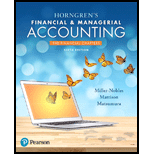
Horngren's Financial & Managerial Accounting, The Financial Chapters (6th Edition)
6th Edition
ISBN: 9780134486840
Author: Tracie L. Miller-Nobles, Brenda L. Mattison, Ella Mae Matsumura
Publisher: PEARSON
expand_more
expand_more
format_list_bulleted
Question
Chapter 9, Problem 2RQ
To determine
Plant Assets: Plant assets are referred to the long-term and tangible assets that business use in its business operations. Plant assets are also popularly known as Property, Plant, and Equipment or simply the Fixed Assets.
To Explain: The components of the historical cost of the asset.
Expert Solution & Answer
Want to see the full answer?
Check out a sample textbook solution
Students have asked these similar questions
Solve
Journalize the issuance of the stock.
Determine the fixed component using the high -low method
Chapter 9 Solutions
Horngren's Financial & Managerial Accounting, The Financial Chapters (6th Edition)
Ch. 9 - Prob. 1QCCh. 9 - Prob. 2QCCh. 9 - Which method almost always produces the most...Ch. 9 - A Celty Airline jet costs 28,000,000 and is...Ch. 9 - A copy machine costs 45,000 when new and has...Ch. 9 - Suppose Print and Photo Center in the preceding...Ch. 9 - Prob. 7QCCh. 9 - Prob. 8QCCh. 9 - Liberty Corporation reported beginning and ending...Ch. 9 - A truck costs 50,000 when new and has accumulated...
Ch. 9 - Prob. 1RQCh. 9 - Prob. 2RQCh. 9 - Prob. 3RQCh. 9 - Prob. 4RQCh. 9 - Prob. 5RQCh. 9 - What is the difference between a capital...Ch. 9 - Prob. 7RQCh. 9 - Prob. 8RQCh. 9 - How does a business decide which depreciation...Ch. 9 - Prob. 10RQCh. 9 - Prob. 11RQCh. 9 - Prob. 12RQCh. 9 - Prob. 13RQCh. 9 - How is gain o r loss determined when disposing of...Ch. 9 - Prob. 15RQCh. 9 - Prob. 16RQCh. 9 - Prob. 17RQCh. 9 - Prob. 18RQCh. 9 - Prob. 19RQCh. 9 - What does it mean if an exchange of plant assets...Ch. 9 - Prob. 9.1SECh. 9 - Prob. 9.2SECh. 9 - Prob. 9.3SECh. 9 - Prob. 9.4SECh. 9 - Prob. 9.5SECh. 9 - Prob. 9.6SECh. 9 - Prob. 9.7SECh. 9 - S9-8 Discarding an asset
On October 31, 2018,...Ch. 9 - Prob. 9.9SECh. 9 - Prob. 9.10SECh. 9 - Prob. 9.11SECh. 9 - Prob. 9.12SECh. 9 - Prob. 9.13SECh. 9 - Prob. 9.14SECh. 9 - S9A-15 Exchanging plant assets
Micron Precision,...Ch. 9 - S9A-16 Exchanging plant assets
White Corporation...Ch. 9 - Prob. 9.17ECh. 9 - E9-18 Making a lump-sum purchase of...Ch. 9 - Prob. 9.19ECh. 9 - E9-20 Computing depreciation—three methods
Crispy...Ch. 9 - E9-21 Changing an asset’s useful life and residual...Ch. 9 - E9-22 Recording partial-year depreciation and sale...Ch. 9 - Prob. 9.23ECh. 9 - Prob. 9.24ECh. 9 - Prob. 9.25ECh. 9 - Prob. 9.26ECh. 9 - Prob. 9.27ECh. 9 - Prob. 9.28ECh. 9 - Prob. 9.29ECh. 9 - Prob. 9.30APCh. 9 - P9-31A Determining asset cost, preparing...Ch. 9 - Prob. 9.32APCh. 9 - Prob. 9.33APCh. 9 - Prob. 9.34APCh. 9 - Prob. 9.35APCh. 9 - Prob. 9.36BPCh. 9 - Prob. 9.37BPCh. 9 - Prob. 9.38BPCh. 9 - Prob. 9.39BPCh. 9 - Prob. 9.40BPCh. 9 - Prob. 9.41BPCh. 9 - Prob. 43CPCh. 9 - Prob. 9.1TICh. 9 - Western Bank Trust purchased land and a building...Ch. 9 - Prob. 9.1FCCh. 9 - Prob. 9.1FSCCh. 9 - In 150 words or fewer, explain the different...
Knowledge Booster
Learn more about
Need a deep-dive on the concept behind this application? Look no further. Learn more about this topic, accounting and related others by exploring similar questions and additional content below.Similar questions
- What is the initial gross margin of this financial accounting question?arrow_forwardNeed answerarrow_forwardDelta Corporation has revenues of $400,000 and deductible expenses of $390,000. It received a $50,000 dividend from Luna Enterprises, in which it holds a 15% stake. What is Delta Corporation's taxable income?arrow_forward
arrow_back_ios
SEE MORE QUESTIONS
arrow_forward_ios
Recommended textbooks for you
- Century 21 Accounting Multicolumn JournalAccountingISBN:9781337679503Author:GilbertsonPublisher:Cengage
 College Accounting, Chapters 1-27AccountingISBN:9781337794756Author:HEINTZ, James A.Publisher:Cengage Learning,
College Accounting, Chapters 1-27AccountingISBN:9781337794756Author:HEINTZ, James A.Publisher:Cengage Learning,

Century 21 Accounting Multicolumn Journal
Accounting
ISBN:9781337679503
Author:Gilbertson
Publisher:Cengage


College Accounting, Chapters 1-27
Accounting
ISBN:9781337794756
Author:HEINTZ, James A.
Publisher:Cengage Learning,


Property, Plant and Equipment (PP&E) - Introduction to PPE; Author: Gleim Accounting;https://www.youtube.com/watch?v=e_Hx-e-h9M4;License: Standard Youtube License